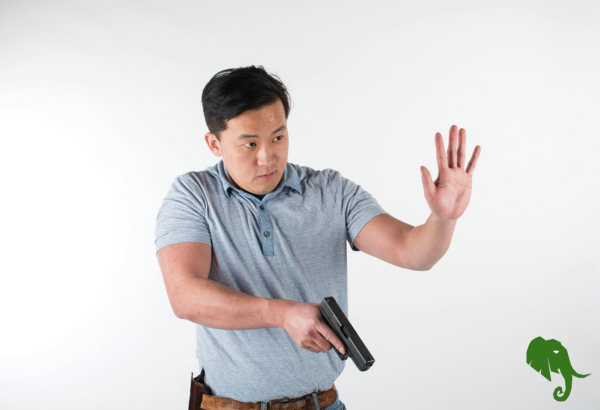
We all have the right to defend ourselves and those we care about but understanding when and how we can legally do so is critical. Self-defense laws vary by state, and what’s lawful in one jurisdiction could land you in legal trouble in another. As someone who travels frequently and carries an everyday carry (EDC) setup, I believe every responsible gun owner and self-defense-minded citizen should know the law as well as they know their weapon. In this article, we’ll break down the fundamentals of self-defense laws in plain language so you can carry with confidenceand stay within your legal rights
What Is Self-Defense in Legal Terms?
The dictionary defines self-defense as “the defense of one’s person or interests, especially through the use of physical force, which is permitted in certain cases as an answer to a charge of violent crime.”
Put simply, self-defense is the use of reasonable force to protect yourself or a family member from bodily harm caused by an aggressor. The key word here is reasonable. You must believe that the force used was necessary to prevent injury or death, and that belief must align with what a reasonable person would perceive in the same situation.
Self-defense is typically judged by three core elements:
1. Imminence – The threat must be immediate.
2. Proportionality – The force used must be proportionate to the threat.
3. Reasonableness – A reasonable person would act similarly in that situation.
Let’s say someone lunges at you with a knife in a dark parking lot. If you draw your legally concealed firearm and shoot to stop the threat, most jurisdictions would likely view that as justified, provided you did not escalate the encounter or ignore opportunities to retreat in a duty-to-retreat state. However, if you shoot someone over a verbal altercation, even if you felt insulted or provoked, you’re likely to face legal consequences.
The threat must be both immediate and serious enough that a reasonable person would fear death or significant bodily harm. Put simply, if your life is in immediate danger and there’s no way to safely retreat, defending yourself with equal or greater force may be considered reasonable.
Key Doctrines That Shape Self-Defense Laws
Self-defense laws vary across states, but most are guided by three key legal doctrines: Duty to Retreat, Castle Doctrine, and Stand Your Ground. Understanding these principles is essential to knowing when and where you can legally use force.
- Duty to Retreat: In some states, the law requires you to attempt to avoid a confrontation if it can be done safely, before resorting to force. States like New York, Massachusetts, and New Jersey generally follow this standard, especially in public spaces.
- Castle Doctrine: All 50 states recognize some form of the Castle Doctrine, which allows individuals to use force, including deadly force, to defend themselves in their home without a duty to retreat. Some states also extend this protection to vehicles or workplaces. However, certain conditions apply—such as the intruder being unlawfully and forcibly present.
- Stand Your Ground: Roughly 30 states, including Georgia, Florida, and Texas, have Stand Your Ground laws that remove the duty to retreat in public places. These laws allow you to use force if you are lawfully present and reasonably believe you’re facing an imminent threat.
For example, Georgia, my home state, recognizes both Castle Doctrine and Stand Your Ground protections (§ 16-3-23 and § 16-3-23.1). That means residents have no legal obligation to retreat, whether they’re at home or in public. By contrast, states like California impose more nuanced requirements. Even within your home, the use of deadly force must meet a high standard of reasonable belief and proportionality.
Lethal vs. Non-Lethal Force
A crucial part of self-defense law is distinguishing between non-lethal and lethal force:
– Non-lethal force includes actions like using pepper spray, a Taser, or physical restraint.
– Lethal force refers to any action likely to cause death or serious bodily harm, such as the use of a firearm.
Lethal force is typically only justified if you reasonably believe you or someone else is in immediate danger of being killed or seriously injured.
Consider this: if someone tries to snatch your phone and run, pulling your gun is not a proportionate or reasonable response, therefore it could result in criminal charges. But if someone charges at you with a crowbar, the justification for lethal force becomes more legally sound.
Common Misconceptions About Self-Defense
There are a lot of dangerous myths floating around about self-defense. Let’s clear up a few of the most common questions that most people have when it comes to self-defense:
If someone breaks into my house, can I shoot them?
Not necessarily. The Castle Doctrine may apply, but you still need to prove that you reasonably believed the intruder posed an imminent threat. Simply being in your home doesn’t always justify deadly force, especially if the intruder is unarmed or non-aggressive.
Can I use my weapon if I feel threatened?
Feeling threatened isn’t enough, there must be an imminent risk of serious bodily harm or death. Your fear must be reasonable and supported by the facts of the situation. Courts will consider whether you were the initial aggressor, whether lesser force was an option, and whether you had the ability to retreat.
Am I protected under the Second Amendment to act however I choose?
No. The Second Amendment protects your right to bear arms, not to use them unlawfully. You’re still subject to your state’s laws on use of force and self-defense.
Understanding these nuances helps ensure you don’t cross a legal line in a high-stress situation. A moment of misjudgment can lead to life-altering consequences, civil lawsuits, criminal charges, or even imprisonment.
What to Do After a Defensive Incident
If you ever use force in self-defense, what you do afterward is just as important as what you did in the moment. Here are the immediate steps you should follow:
1. Call 911 – Report the incident and request law enforcement and medical assistance if needed. Even when at home, when calling 911, the most important and first piece of information to provide is your location. This allows emergency services to dispatch help to the correct place as quickly as possible.
2. Limit your statements – You can provide basic facts (e.g., “I was attacked. The person is down. I’m the victim.”) but wait for legal representation before discussing details.
3. Do not tamper with the scene – Leave everything as it is to preserve evidence.
4. Cooperate respectfully – Follow officers’ instructions but remember your right to remain silent until legal counsel is present, even if you feel you are innocent.
Saying something as simple as “I’m sorry” can be misinterpreted as an admission of guilt. Be calm, be respectful, and exercise your right to counsel.
Training Is More Than Just Range Time
A responsible self-defense mindset involves more than just marksmanship. Owning a firearm or carrying a non-lethal tool is only one part of the equation. Just as important is understanding your state’s self-defense and use-of-force laws, knowing how to handle post-incident legal encounters, and recognizing when it’s wiser to walk away or de-escalate a situation.
Organizations like the USCCA, NRA, and various state-specific programs offer legal education tailored to everyday carriers. Concealed carry insurance (such as USCCA or US Law Shield) can also provide legal and financial protection in the aftermath of a defensive incident, including 24/7 attorney hotlines.
At OwnGuard Solutions, we offer training and resources to help you become a more informed and legally prepared defender. Whether you’re new to personal protection or looking to deepen your understanding of lawful self-defense, our goal is to equip you with practical knowledge and confidence.
Final Thought
Understanding self-defense laws is about more than knowing when you’re allowed to use force, it’s about making clear-headed, lawful decisions in high-stress situations. Knowing your rights, understanding the legal boundaries, and preparing through responsible training can make all the difference when it matters most. Self-defense should be rooted in accountability, legality, and the ultimate goal of preserving life and preventing harm.
It is imperative that you become familiar with your state’s self-defense laws, and those states you often travel to. Being legally prepared is just as important as being physically prepared. It could mean the difference between being a hero in your own defense or becoming the subject of a lengthy legal battle.
Related Content

The Ultimate Self-Defense Tools
Overview Season 2, Episode 18 In this riveting episode of the Self-Initiative Project Podcast, join host Jim as he delves into the nuances of self-defense,…

Beyond the Basics: Gun Safety, Mental Health, and Integrity in Training
Join us for Episode 16 as we welcome renowned firearms expert and educator Rob Pincus. Dive deep into the principles that drive Rob’s company, ICE…

Deciding On a Home Defense Tool
A few weeks ago, I was visiting our local firearms shop and overheard a customer discussing with one of the staff choices for a home defense…

Conflict Avoidance and Use of Deadly Force
The new year has arrived, and if you’ve been following the news, you know that many changes are taking place. Speculation about how these changes will…

Read other OwnGuard Solutions blog posts
Read our other posts centered around being safer and better prepared.


This is great information! I highly recommend anyone that conceal or open carry follow OwnGuard Solutions for this valuable information. Thanks for sharing!
Very important information in this article. I as someone who has always believed that it’s better to be judged by 12 than carried by 6, has to realize that in today’s world that’s not a very good way of thinking. You can definitely find yourself in a serious legal situation without knowledge of your state laws regarding self defense and use of lethal force…
I highly recommend checking out OwnGuard Solutions—they’re an excellent resource for any questions or information you might need as a current or prospective gun owner. They offer training, and personalized support. The team is knowledgeable, professional, and always ready to help. Whether you’re new to firearms or just want to stay informed, they’ve got you covered.
Great information
Great information for ones that choose to defend themselves or want to prepare to do so!
This is a great read for everyone! Very informative.
Great information for everyone to have .You can never be too informed about protection your home .